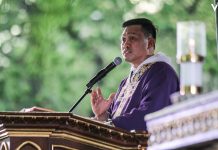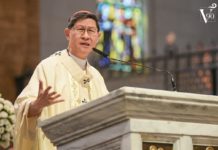 NOT EVEN the late dictator Ferdinand Marcos clashed head on with the Catholic Church.
NOT EVEN the late dictator Ferdinand Marcos clashed head on with the Catholic Church.
Even before he entered the presidential race last year, coming late into the fray apparently to spare himself a grilling, Rodrigo Duterte had already started to pounce on the oldest institution in the world.
After winning the presidency, Duterte called the bishops “sons of whores” and warned them not to mess with him. Following the outcry of the Catholic Bishops Conference of the Philippines (CBCP) on the rising number of extrajudicial killings (EJKs) which has already resulted in more than 7,000 deaths, Duterte called for a showdown with the Church, saying the bishops had no moral ascendancy.
But Duterte’s tirades did not stop there. He then went after Novaliches Bishop Emeritus Teodoro Bacani. He accused him of supporting two wives, and castigated the prelate for being profiled in the book “Altar of Secrets: Sex, Politics, and Money in the Philippine Catholic Church,” an investigative report on the local Church official’s alleged corruption and abuses.
This is not the first time that a president took on the Catholic Church. Former President Benigno Aquino III also criticized the Filipino Church officials in front of Pope Francis during the Holy Father’s visit at Malacanang Palace in 2014. He accused the local bishops of allegedly putting up with the purported abuses of the administration of his predecessor, Gloria Macapagal-Arroyo.
Duterte’s verbal abuse is part of his ideological war of attrition with the Church being waged especially in the social media where his trolls and fanatics repeat his abuse and spread his lies.
Filipinos should now realize the President’s megalomania. Tolerating no opposition to his genocidal drug wars, he has dared take on the Church which is a pillar of human rights as historically shown by the Church’s historic opposition against despotism.
The public should also realize that the President attacks the Church to shift people’s attention away from his administration’s lapses, such as graft and corruption and even assassinations and kidnap-for-ransom of the Philippine National Police.
Former CBCP’s Commission on Family and Life executive secretary Fr. Melvin Castro told the Varsitarian that Duterte’s rants serve as “smokescreen” for issues hurled against him, such as the EJKs and the scandalous “Tokhang-for-ransom” and immigration extortion.
But Church officials should know when and how to respond to Duterte’s attacks. They should not go down to his level. Bacani’s riposte for example might have backfired since Duterte’s trolls in the social media capitalized on it to raise again the tired issue of the Church’s alleged riches.
Moreover, the Church has a lot of house-cleaning to do since it is evident that some sectors of the clergy and religious either agree with Duterte’s draconian measures to check the drug menace or are afraid to oppose him.
While the Association of Major Religious Superiors of the Philippines has condemned the EJK’s as early as August 2016, many in the diocesan clergy has remained mum until quite lately.
Thus, the January 20 pastoral letter condemning the drug killings has been a welcome relief and a morale booster for many of us horrified and anxious by the genocide going on in our midst. CBCP President and Lingayen-Dagupan Archbishop Socrates Villegas has done an inspiring job of consolidating the CBCP to voice out its opinion and condemnation strongly.
The Catholic Church since she is founded by Jesus Christ is perfect, but its shepherds are not. Some of her bishops and priests commit acts that are an embarrassment to the Church and traumatizing to the Filipino faithful. But we should remember that they were put there by God, who alone can judge them. Their mistakes and atrocious acts do not justify Duterte’s attacks on the Church.
The people always forget easily but at the end of the day, the Church will be there to comfort them in times of distress. People should look at the Church with a broader lens: warts and all, the Church has been a positive force in history and humanity.
Now that the nation is about to celebrate the anniversary of the 1986 People Power Revolt, it is best to remember the positive contributions of the Church to Philippine history.
If it is any indication, Duterte’s decision to allow the burial in the Libingan ng Mga Bayani to Marcos, who was ousted in 1986 by the Edsa Revolt that resulted from the dramatic call of Cardinal Jaime Sin, should indicate he has numbered himself on the side of murderous despotism.
Definitely all of us conscientious Filipinos should expect the Church to continue being a positive force in our history by leading the nation against all forms of despotism, then as now.














